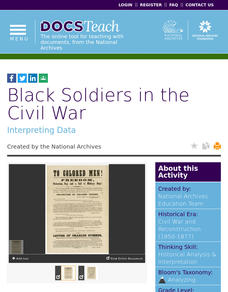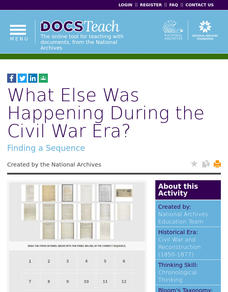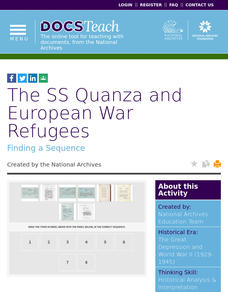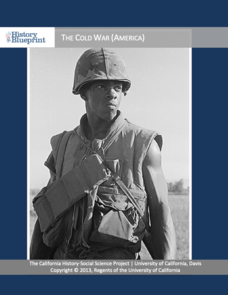Historical Thinking Matters
Spanish-American War: 5 Day Lesson
Nine historical documents, an interactive online notebook, and a fantastic opportunity for historical inquiry await your pupils in this 5-day lesson plan. Class members identify and discuss various causes for the Spanish-American War...
Smithsonian Institution
Borders with the World: Mexican-American War and U.S. Southern Borderlands
The Mexican-American War created social borders—not just physical ones. Scholars learn about the effects of the Mexican-American War on the people living in the borderlands using text excerpts, maps, and partnered activities. Academics...
Historical Thinking Matters
Spanish-American War: 3 Day Lesson
Why did the United States choose to invade Cuba in 1898? As part of a 3-day lesson, your young historians will first develop working hypotheses to answer this question, then work with a variety of historical primary source documents that...
Historical Thinking Matters
Spanish-American War: 1 Day Lesson
After analyzing newspaper articles portraying different perspectives of the explosion of the Battleship USS Maine, your young historians will take a stand on which position is the most believable in both discussion and writing.
National Endowment for the Humanities
How to Win a World War
High schoolers are have begun to learn the art of diplomacy with each other, but do they understand how diplomacy works at a global level? The second in a series of four lessons, guides scholars in evaluating primary sources....
DocsTeach
Americans on the Homefront Helped Win World War I
Saving sugar, growing crops, and not eating meat sound like small things, but they were a huge part of the home front effort during World War I. Photographic evidence of civilian struggles during the war, along with a matching game,...
Barren County Schools
American Revolution Project
Here you will find three simple and engaging American Revolution projects that will allow your learners to not only express their comprehension of major events and key terms during the war, but also offer the opportunity for great...
Center for History Education
Pontiac's War
Invaders are coming: fight them off or run? Native American peoples had to decide this question after British colonists went west following the French and Indian War. Using a speech from Chief Pontiac, young historians consider if they...
Center for History Education
Cold War Case Files: The Rosenberg Trial - Was Justice Fairly Served?
The Rosenbergs—executed for their role in a Soviet-era spy ring—continue the captivate the American imagination. Using a history lab format, young historians examine the trove of documents associated with the case, including photographs...
National Endowment for the Humanities
Lesson 3: Britain, Napoleon, and the American Embargo, 1803–1808
While the French were once the allies of Americans, the Napoleonic Wars saw the United States almost drawn into a war with its one-time friend. Wars in Europe threatened to draw in the early republic. A primary source-based activity...
Civil War Trust
Map the Civil War
Mapmaking was a very important element in successfully planning attacks on enemies during the Civil War. Guide pupils through the process of pacing to find the average length of their steps, measure the distance between one object...
Civil War
Civil War Medicine: Fact or Fiction
Young historians compare the presentation of medical care during the Civil War in passages from fictional and nonfictional texts. They examine passages from Gone with the Wind by Margaret Mitchell and Soldier's...
DocsTeach
Black Soldiers in the Civil War
Get hands on virtually with recruitment posters for African American soldiers during the Civil War with an interactive online resource. By highlighting key phrases in the posters using an Internet tool, learners discover how African...
DocsTeach
What Else Was Happening During the Civil War Era?
Examine a time of political division and upheaval— not unlike our own—using firsthand accounts. While study of the Civil War often takes center stage in the classroom, the 1850s and 1860s were a period of profound change in other areas...
National Endowment for the Humanities
Empire and Identity in the American Colonies
The American Revolution was born out of a European conflict that spilled over into North America—and the documents prove it! Using primary sources from the era of the French and Indian War, including British plans to try to unite its...
DocsTeach
The SS Quanza and European War Refugees
World War II not only resulted in major loss of life, but it also displaced thousands of people. An eye-opening activity uses primary documents to explore the refugee crisis during World War II. Scholars compare the event to modern-day...
DocsTeach
Baseball on the World War I Homefront
Are sports essential to American life? Young historians ponder the question as they examine letters between the owner of the Boston Red Sox and Navy Secretary Franklin D. Roosevelt during World War I. The owner wanted two star players...
The New York Times
Teaching the Vietnam War with Primary Sources from the New York Times
Use the New York Times database of primary sources to teach a unit on the Vietnam War. The resource consists of a variety of primary sources as well as a lesson plan showcasing how to teach a instructional activity using them....
National Endowment for the Humanities
The Gulf of Tonkin Resolution and Escalation of the Vietnam War
The Gulf of Tonkin Resolution propelled America's involvement into a bloody conflict—and it was based on a fallacy. Using the resolution and other documents from the Vietnam War, including declassified documents, young historians...
DocsTeach
President Reagan and the Cold War: Vision and Diplomacy
After years of boiling tension, the presidency of Ronald Regan and the rise of Mikhail Gorbechev paved a new way forward for diplomacy between the United States and the Soviet Union. Using primary source documents, including letters...
Center for History Education
How Did the Public View Women’s Contributions to the Revolutionary War Effort?
Calling upon the legacies of Joan of Arc, Elizabeth I, and Catherine the Great, Esther Reed rallied Southern women to support the American Revolution. Using a broadside by Reed and other primary sources, such as poetry, young historians...
Center for History Education
To What Extent Were Women's Contributions to World War II Industries Valued?
Women rose to the challenge when the nation's war effort called them—but were sent home when the GIs came back from World War II. Young historians consider whether the United States valued women's contributions during the war using a...
University of California
The Cold War (America)
The Cold War—with its roots in World War II—impacts the world today. Using an extensive curriculum, scholars consider its impact through primary sources, including speeches and propaganda, as well as other skills-enhancing activities. An...
Syracuse University
World War I
World War I was known for its gruesome battlefields and horrific injuries. Using photographs from a battlefield surgeon's scrapbook, scholars see first-hand what life was like in the trenches. After creating a timeline of the war using...
Other popular searches
- Native American Wars
- Spanish American Wars
- 20th Century American Wars
- Latin American Wars
- American Wars Lesson Plans























